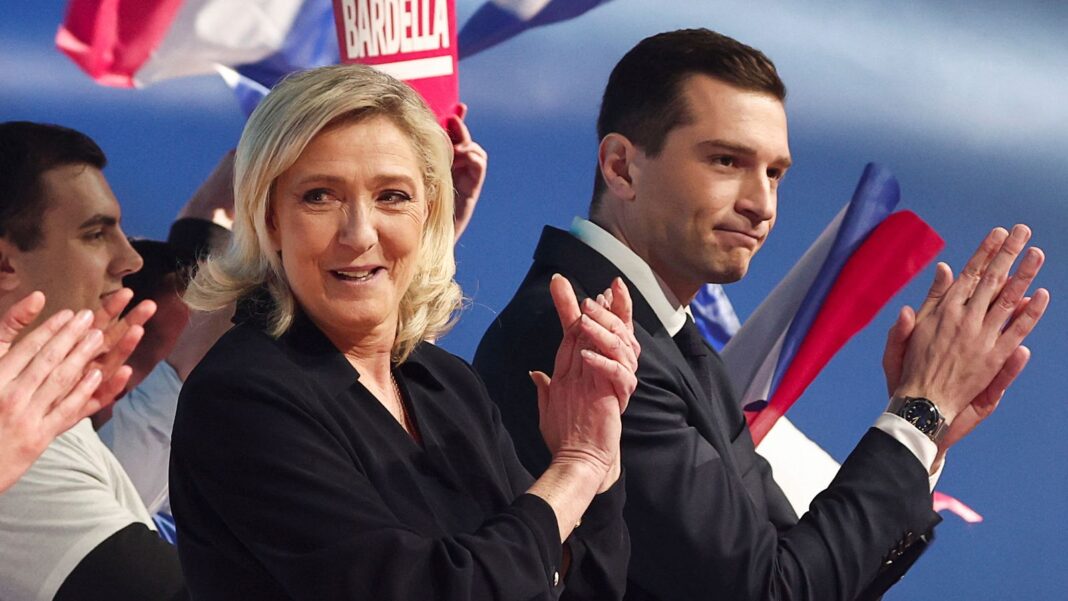Emmanuel Macron’s announcement that he intended to dissolve parliament and call for a snap election came as a shock on Sunday night.
The French president, who was been in power since 2017, said it was time for the country to have its say after his centrist Renaissance party suffered a calamitous result in the EU election.
What’s happened?
Mr Macron has called for a snap election to take place from later this month after being trounced in European Parliament elections by Marine Le Pen’s far-right National Rally.
This content is provided by X, which may be using cookies and other technologies.
To show you this content, we need your permission to use cookies.
You can use the buttons below to amend your preferences to enable X cookies or to allow those cookies just once.
You can change your settings at any time via the Privacy Options.
Unfortunately we have been unable to verify if you have consented to X cookies.
To view this content you can use the button below to allow X cookies for this session only.
National Rally won about 32% of the vote in France – about twice as much as Mr Macron’s pro-European party that is projected to reach around 15%.
“I’ve decided to give you back the choice of our parliamentary future through the vote,” the president said while addressing France from the Elysee Palace.
“I am therefore dissolving the National Assembly.”
Ms Le Pen and National Rally leader Jordan Bardella have welcomed upcoming elections. File pic: AP
He went on: “I have heard your message, your concerns, and I will not leave them unanswered.
“France needs a clear majority in order to act with serenity and harmony.”
The vote will take place in two rounds on 30 June and 7 July.
What is National Rally?
The National Rally is a nationalist and populist right-wing party, which has benefitted from the rise of the right across Europe.
Until 2018, it was known as the National Front but in a bid to improve its image it rebranded as Ms Le Pen worked to try and soften the party’s image and shake off long-standing accusations of racism and antisemitism.
Founded in 1972 by Jean-Marie Le Pen, Ms Le Pen’s father, today, the party is led by Jordan Bardella, a 28-year-old who has been fast-tracked to political leadership.
They are the single biggest opposition party with 88 MPs and are hoping to appeal to what they say are the people of France’s main concerns – immigration, the cost of living and crime.
National Rally takes a hard line on immigration, wanting to drastically curb it, and although it no longer wants to leave the EU, it has said it would reform it.
Despite softening in recent years, National Rally is still considered a far-right party whose ascent to power would change Europe noticeably.
How has National Rally reacted?
Ms Le Pen, who was widely seen as the frontrunner for the 2027 election in which Mr Macron is unable to stand, welcomed his decision.
“We are ready to take power if the French people have confidence in us in these forthcoming legislative elections,” she said.
“We are ready to put the country back on its feet.”

Keep up with all the latest news from the UK and around the world by following Sky News
Read more:
Europe decides – how will election shape continent politics?
National Rally’s lead candidate for the EU election and Ms Le Pen’s protege, Jordan Bardella, is only 28.
But he immediately took on a presidential tone with his victory speech in Paris.
Mr Bardella, who is also the party’s president, addressed his “dear compatriots” and went on to say: “The French people have given their verdict, and it’s final.”
What does this mean for the French president?

Mr Macron could be forced into ‘cohabitation’. Pic: Reuters
Mr Macron is taking a big risk with the snap vote (it was 1997 when the country last had one) and could be seen as a move that could backfire and increase the chances of Ms Le Pen eventually taking power.
If his party ends up losing, Mr Macron – who in the last recorded week had a mere 21% approval rating, according to Morning Consult – may be forced into “cohabitation”.
It’s a term used in France to refer to a president having to stand alongside a prime minister from an opposing party.
What do the parties stand for?
Mr Macron has been advocating for Europe-wide efforts to defend Ukraine and the need for the EU to boost its own defences and industry.
Mr Bardella wants to limit free movement of migrants by carrying out national border controls and dial back EU climate rules.
The party no longer wants to leave the EU and the euro, but aims to weaken it from within.







